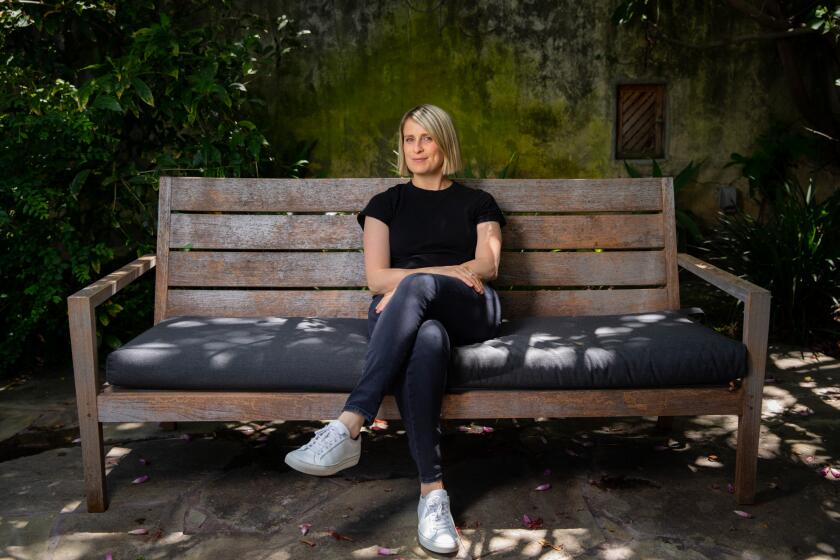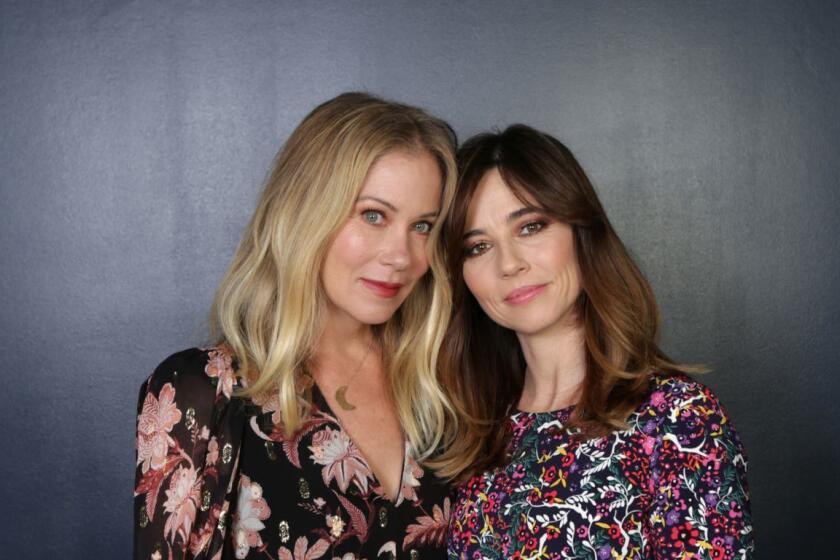‘Dead to Me’ stars open up about the bond that saw them through a ‘difficult’ year
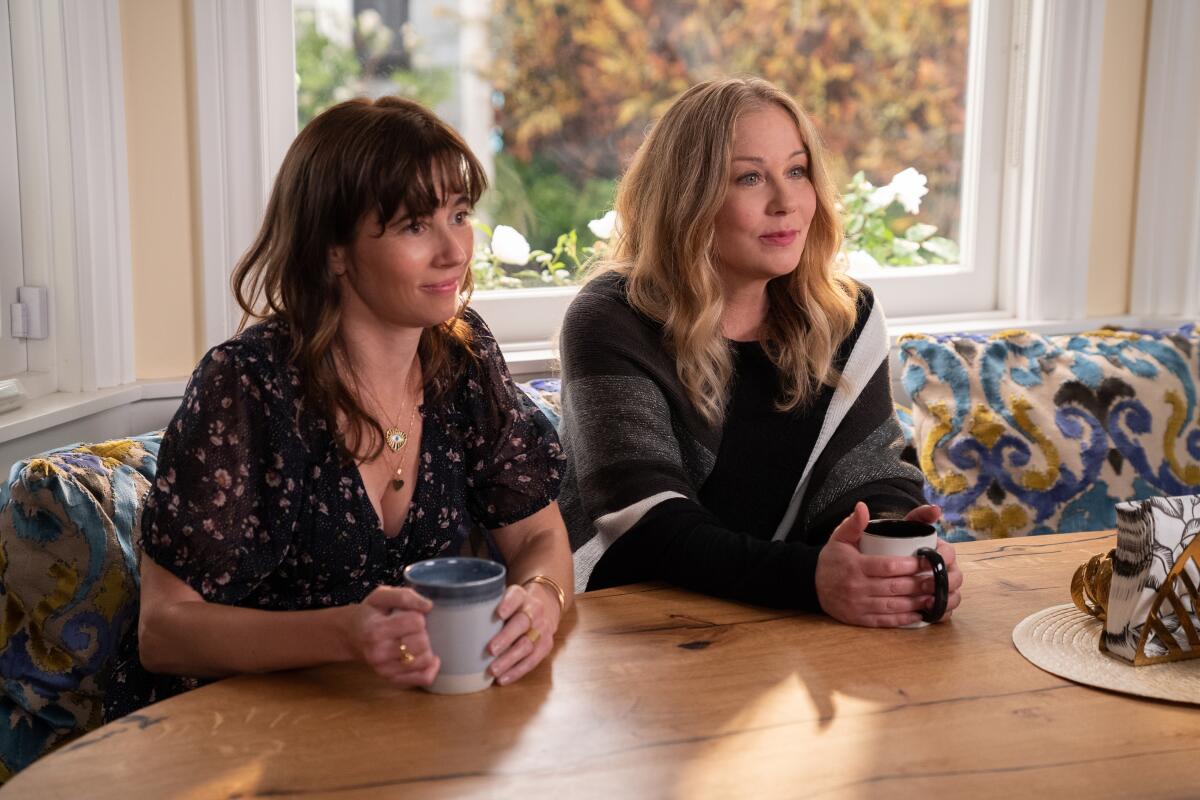
- Share via
Warning: The following contains major spoilers from Season 3 of “Dead to Me.”
Liz Feldman, the creator of “Dead to Me,” wants you to know she’s sorry. Even though the series finale sees fans’ two favorite gal pals, Judy (Linda Cardellini) and Jen (Christina Applegate), evade punishment for the deaths of their husbands, it’s not what you’d call a perfectly happy ending: After learning she had terminal cancer earlier in the season, Judy sets out to Mexico to enjoy her last days alongside Jen, who is pregnant with Ben’s (James Marsden) child.
As Feldman told The Times, “Can I just give one big blanket apology?”
She says the idea for how to wrap the Netflix series, whose third and final season premiered Thursday, came in the middle of filming Season 2. She wanted to bring closure and healing to the characters, while still honoring the themes of grief, loss, forgiveness and friendship that have swirled around Jen and Judy throughout the show’s run.
“A happy ending in the classic sense wouldn’t feel right for this show,” she says. “I knew that it felt disingenuous to have everybody come off unscathed, and everything’s fine. And it just would have felt a little bit like, ‘Well, what’s the point of all of that?’ So, rather than it being about morality or about karma getting them in the end, to me, I was just focused on wanting to heal both of the characters, and wanting the idea of grief — which is the central motif that brought them together — to be what also, ultimately, brings them apart.”
Liz Feldman, creator and showrunner of Netflix’s “Dead to Me,” explains how the coronavirus outbreak has reshaped her life — and her thinking about the show.
Feldman and the writers also knew that they wanted some ambiguity about Judy’s death, which is why it doesn’t happen on screen.
“We started writing this season in June 2020, right at the heart of the pandemic,” she says. “We were all experiencing this crazy existential moment where there’s this like unseen force called COVID. And there was a form of ambiguous grief that we all felt during that time for the loss of the life that we all had, the loss of togetherness, the loss of just things as we knew it. And so I wanted to sort of honor that ambiguous grief.... I was just trying to mirror what it’s like to lose someone, which is that one moment they’re there and then they’re gone. And you’re not really quite sure where they went.”
That Applegate and Cardellini brought such emotional depth and love to an unlikely friendship on screen — it’s not every day a widow becomes besties with the person who left her husband for dead — is of little surprise to Feldman.
“I watched this weird, parallel friendship form,” she says. “As Jen and Judy were becoming friends on camera, Christina and Linda were becoming friends off-camera. I watched these two women constantly be there for each other, in really profound ways and through a lot of difficult moments. They leaned into each other, they leaned on each other. It is honestly such a gift to have experienced it and to have watched it unfold.”
For the viewers who want to cuddle up with more Cardellini and Applegate content, we gathered the pair over Zoom to discuss “Dead to Me’s” emotional ending. Read it, print it out and make a crane out of it.
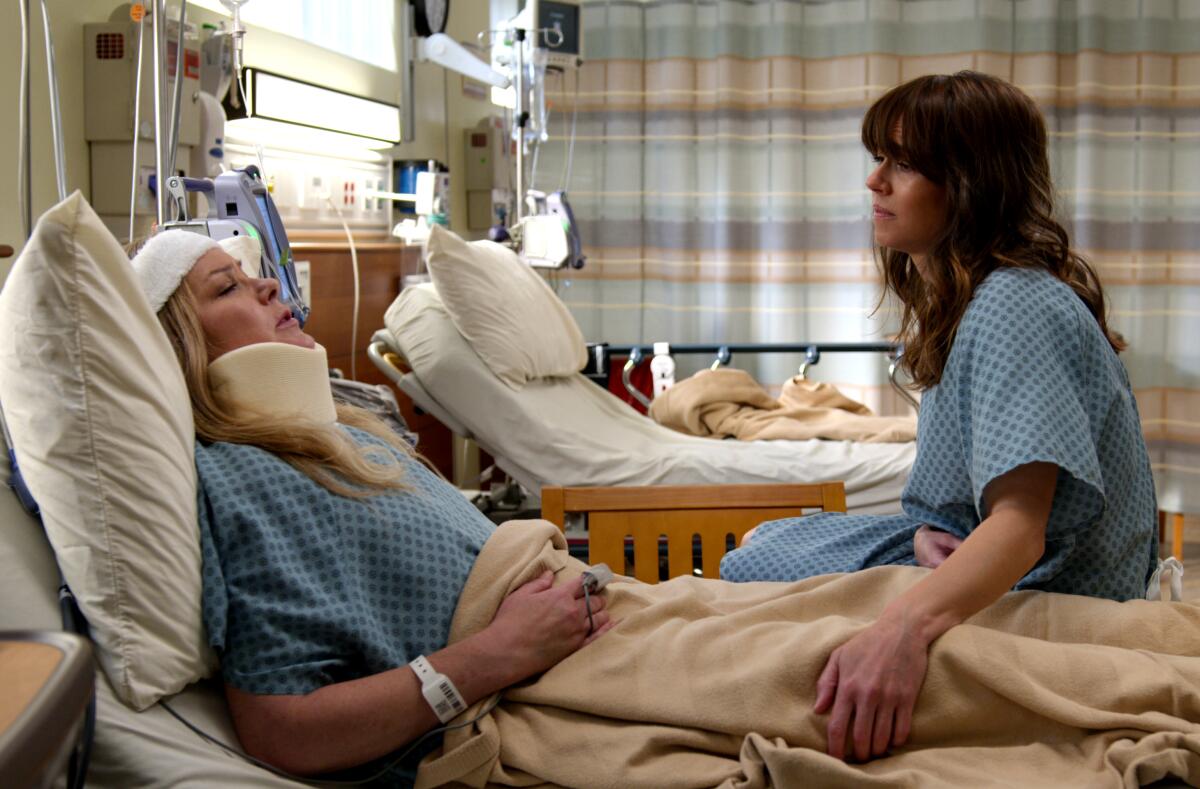
Before you saw the scripts for the final season, how did you expect it to end? What did you want to see happen?
Applegate: I really didn’t want it to end, but, I mean, we had to. There’s only so much we can do until Jen and Judy, like, join the circus. I didn’t want to look at any of the scripts, to be honest with you. I told Liz, “Don’t send them all to me at once, please.”
Cardellini: I was wondering who was gonna go down for the murders — how they were going to handle that... Halfway through Season 2, Liz had told me, “I think I know what happens.” And she told me some of it. And I thought, “Oh, OK.” I love when she tells me something, because even if I try to imagine based on what she says it’s going to be, it’s always better than I imagined.
Applegate: She doesn’t tell me because she made the mistake of telling me before Season 2 that Steve was gonna have a twin. And I said to her, “That is the stupidest thing I’ve ever heard. Are you ‘Punk’-ing me?” And she goes, “No, it’s happening.” So she knows not to tell me because I have no imagination.
Did you feel that there had to be an element of an unhappy ending for Jen and Judy? That, in some sense, they had to atone for the bad things, the deaths, that had transpired?
Cardellini: It still has to feel like it’s “Dead to Me.” I think that it does. One of the things that “Dead to Me” does is it introduces all of these questions, and some of them are answered and some of them are sort of left untidy, as Liz says, but I think that the themes of the show — friendship, grief, loss and forgiveness — because of what happens in the end, you feel those more deeply than you might have if Jen and Judy rode off into the sunset.
Applegate: I don’t think that it would have been our show had we wrapped it up beautifully. We want to make you really pissed and really sad and happy all at the same time. At the end, you’ve got what happens, but you also have a birth. In death there is life and in life there’s death.
What do you make of fans still rooting for them to find a way out of their mess at the end?
Applegate: I’m pretty convinced that Judy just went to a taqueria. She took the boat. This is what I always say: She’s at the taqueria, she’s having a marg, and all of a sudden, this guy comes over and he’s like, “I have a cure for cancer.” This is what, in my mind, has to be happening. She’s coming back later. She just went to go get some tacos and a drink.
Cardellini: Well, and you can never fully trust Judy. So, that could always happen.
James Marsden and “Dead to Me” creator Liz Feldman explain how they kept him around in Season 2 — after offing his character in the Season 1 finale.
The final season is coming out of a bleak moment with this pandemic. Death has been at the forefront of so many of our lives. And beyond thinking of your own mortality, the real fear is the thought of losing loved ones and having to learn how to live on without them. Do you think about death?
Cardellini: I agree with you. I am more terrified of losing the people that I love than anything else and that happens regardless of how much you don’t want it to or how much you worry about it or how much you try to safeguard against it. It is something that comes for all of us. That’s what resonates with us as we’re playing these characters. We can always find the humor and the darkness — and Christina is the best at that... What I relate to the most is that universal truth. It’s all about grief, and it’s all about losing. And grief is really about losing love.
Applegate: I’ve lost myself this last year, you know? Sorry. [Her voice cracks.] I’ve had a death, a quote- unquote “death,” of the person that I was for 50, yep, all those years. And it’s painful because I’m living with the death, I’m living in my own death. That feeling is so f— intense. To try to overcome it, and you’re asked to overcome it, you’re asked to get through it, you’re asked to look at the f— bright side, you’re asked to do all these things in life. And that goes for all of the deaths we’ve had, whether it be a loved one or an icon. We’re asked to move on. And that’s the beauty of this show, is that they’re dealing with it in their own ways. They’re dealing with their grief, their loss... in their ugly, messy, beautiful ways. And I think that’s what resonates with the audience is that we’re not going, “OK, let’s go to therapy. And now we’re cured.” It doesn’t work like that. That’s not how life works.
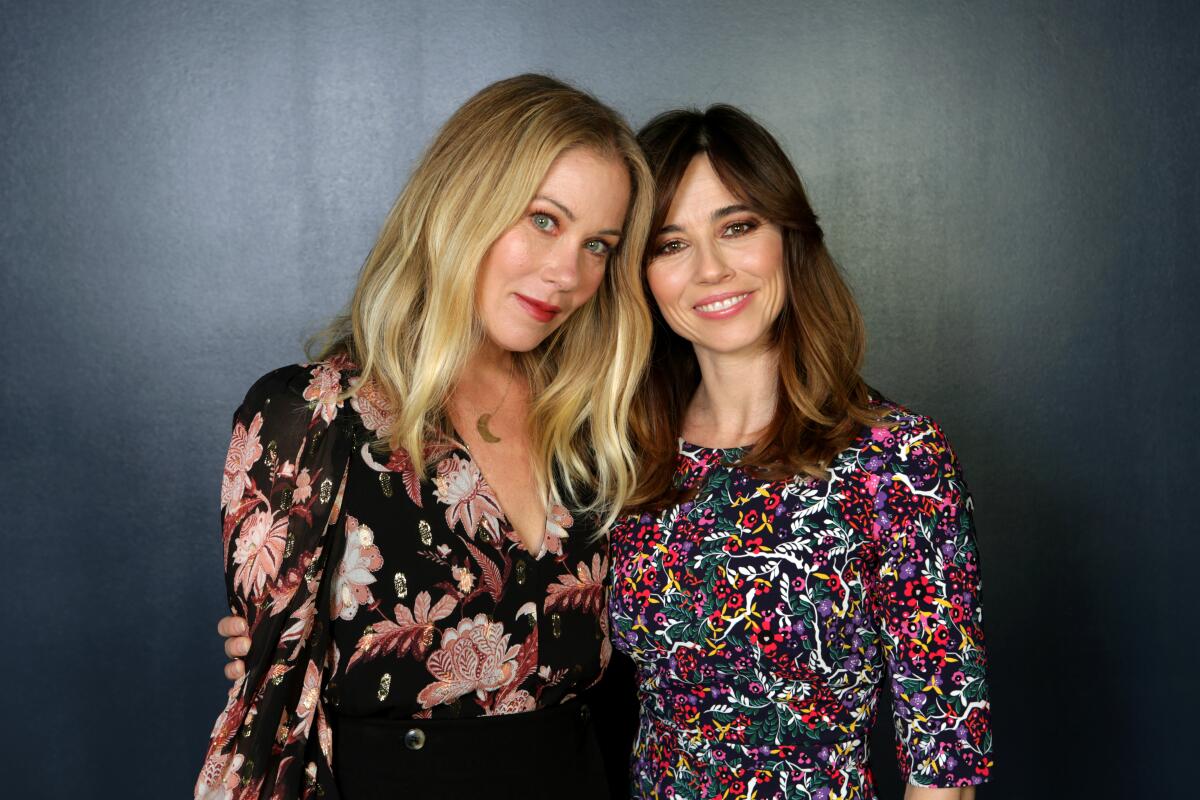
Christina, as you alluded to, you were diagnosed with multiple sclerosis during production. I imagine it was a challenging time. What kept you going? And Linda, how was it to go through it with her?
Applegate: I kept going because of this girl right here. [Points to Cardellini.]
Cardellini: I told you not to keep going, I was like, “I don’t care. You do whatever you need to do.”
Applegate: I know you told me, but I don’t care. I didn’t want to stop being with you. I didn’t want to stop being with you.
Cardellini: I just wanted her to do what was best for her. Work is ... it’s a job. Her and I have been in this industry for long enough to know that work comes and goes, but I wanted her to be able to take care of herself. And I wanted her to make a decision that was best for her. And whatever that decision was, I wanted to be there with you for it. So we were lucky that we have the community around us that we did.
Applegate: And I didn’t want this f— disease to define me either. Because that’s my journey now. After all this has gone, after all these interviews and everything, I have a journey which is my life, which is to find ways to feel a little bit better, to be a better mom, to be present — all these things. That’s my job. So part of showing up for work was going, “I can’t let this take me down” even though I just want to close my eyes and not face it. I can’t let it take me down.
In addition to grief, a lot of this season, and the series as a whole, has been about mothering and the form that can take. And so many moms know what it’s like to have their lives upended by something they never anticipated — not necessarily deadly car accidents and murder — and that feeling of having to pretend like everything is OK when everything around them is in chaos.
Cardellini: Christina and I, we bonded right away about being moms. And we mama bear each other... I just think that motherhood is a really delicate topic for Judy. You see her sort of act outside of herself for a minute there when Jen tells her that she’s going to have a baby because, talk about a twist for Judy, that was like the last thing she thought she was going to hear. And how painful that is, but at the same time, how happy she is for that. Someone once said something to me about grief: When you are experiencing very traumatic grief, say your life is this whole circle [pantomimes a circle with her fingers touching], it fills up the whole circle, and you can’t see anything else beyond that. As time goes on, that grief doesn’t shrink; it stays the same size and stays the same intensity. But your life grows beyond it because things continue to happen. And so I sort of see what happened with Judy’s ending as that grief, but then all of the rest of the things, like Jen’s new motherhood and her acceptance of maybe a more hopeful life with Ben, starts to grow beyond that, and she will have some some kind of Judy optimism in her future.
Applegate: Well, I, for one, am not the mother that Jen is. I worship the ground that my child walks on. When she’s not around, I don’t have reason. She’s my everything. I think that we take motherhood as blood and motherhood is not just about that. It’s about being the warm hug for the people that you love. That’s what a mother does. That feeling of comfort and safety and trust is the word “mothering.” If we even look up the etymology of where the word mother come from — who knows what it is, but I’m sure it wasn’t just like, “the lady” or “the lady who had the thing.” It’s about feeling. And in every twist and turn of this whole thing, these two women, they mothered each other... There was comfort there, and safety. That’s their beautiful love story.
Cardellini: We both have issues with our mothers too. And that sort of coming to play in their adult lives and what that means.
Applegate: Are we talking about me or the characters?
Cardellini: The characters! We do share an on-screen mother in Katey Sagal.
Applegate: Dude, and what’s weird is that yes, my mother is your mother. And I’m mean to her. It was really hard to do. It’s really hard to yell at Katey. That scene took so long because Liz was getting so frustrated with us because we were so calm and polite to each other. And we just couldn’t. And finally, I was like, Katey, I think she wants us to basically [say] “F— you.” We gotta rage out.
How difficult was it to film that final car ride as Jen leaves Mexico without Judy? What do you remember about that day?
Applegate: I don’t remember that day because that was not the last scene. The last thing that we shot was the bed conversation when she says, “I’ve had a really good time.” That was the last scene that we ever shot together. And that was calculated and on purpose because Liz knew that we probably weren’t going to be able to get through it. And it was going to be super depressing. That day, I went home and I like was like gagging and dry heaving because of the pain and the sadness and the saying goodbye to my best friend — so that I remember. The car ride I don’t really remember because I feel like we almost shot it like last summer.
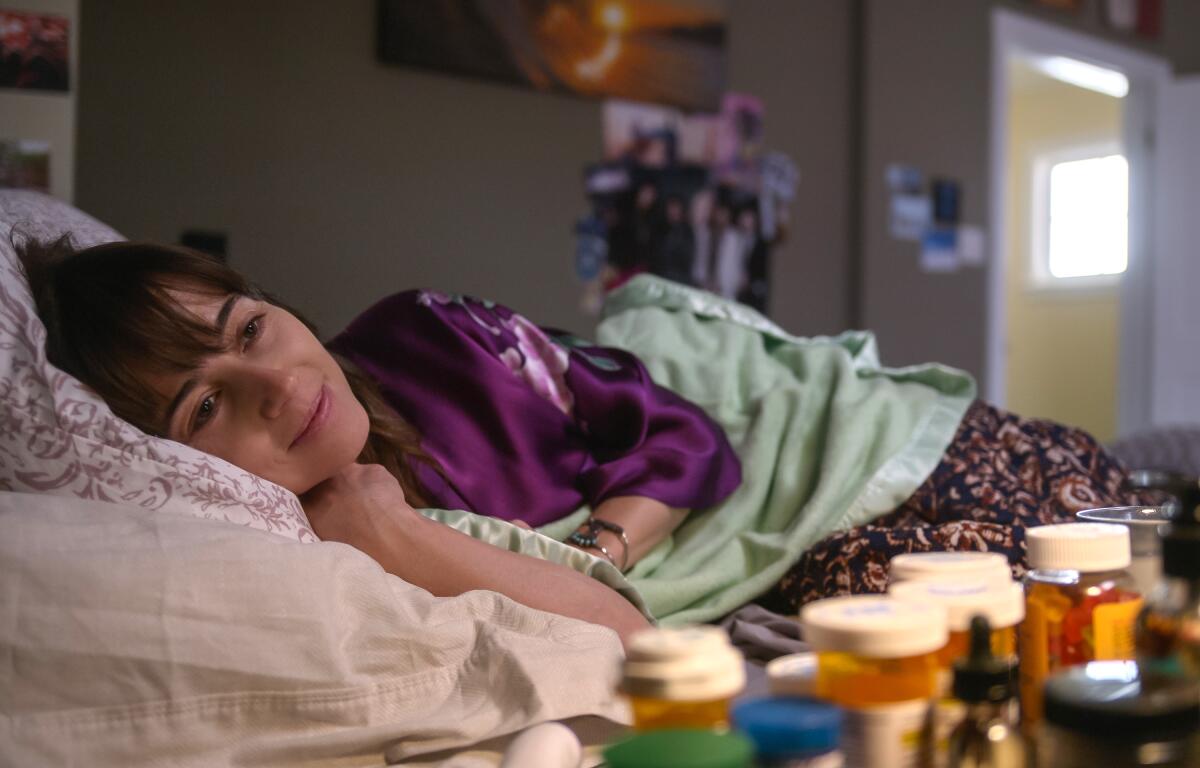
How has your relationship evolved over this time period? What have you learned from your friendship with each other?
Cardellini: God, there’s nothing better than having good friends. I mean, really. We’ve gone through difficult things together; this year being one of the more difficult, but we’ve gone through a lot of difficult things together throughout the years. And you’re there a lot of hours a day, more days than your home or more days than you’re with your friends that you had before, and to be able to have somebody where you can be completely vulnerable, completely honest, and completely supported is just, I mean, what a gift.
Applegate: There were a lot of times over these four years that one of us would have to stop everything and give the other — like, say, “We have to stop right now.” We took turns. We would usher the other one out because we knew that that person needed time, needed a minute. And that doesn’t happen often, especially with women on sets. There’s this notion that we’re supposed to just — if you’re emotional, then you’re weak... you know that crap. The set was not like that because it was run by women, it was directed by women, written by women, lots of women crew members and helmed by two women. So we all get each other. But I always knew that she could see if I was about to break in my life and she’d be like, “Stop — hey, guys, let’s stop,” and then I’d get ushered off, and vice versa, for various reasons.
I think the friendship that you two have offset is what makes it so dynamic on screen. There was a video from the Walk of Fame ceremony [dedicating Applegate’s star] — and there was this tender moment where Linda says something to you as you’re taking in the moment, Christina. Can you share what that was?
Applegate: Oh, yeah. She called me a butthole is what she said.
Cardellini: No, I did not! That’s Christina’s word.
Applegate: I don’t remember. When Linda and I are together, there isn’t anyone else around. I think that goes for not only our personal shared moments, but our onset moments. We sit there and look into each other’s eyes and speak these words and have these experiences and I forget that there’s anyone around watching.
Christina Applegate and Linda Cardellini, who star as unlikely best friends in Netflix’s “Dead to Me,” are cozied up on a sofa in a nook of a West Los Angeles hotel when the conversation quickly turns to baby weight and leaky boobs.
Let’s talk about that final shot, those final words that come from Jen: “Ben ... I have something to tell you.” What went through your mind?
Applegate: You little whippersnapper, Liz Feldman! It was like, of course she’s gonna leave it like that, of course she’s gonna be like, “Oh, s—, is she going to tell him?” and then people are going to talk about it afterwards.
Cardellini: I love it. Because you don’t know what she’s gonna say. In Jen fashion, it could really be anything. Or it could be, I don’t know, maybe Judy’s right around the corner. Or maybe it’s, you know, she’s going to tell them what really happened. And will they make it through that? But I love the idea of you’re not quite sure where it’s gonna go or what the future holds. It keeps it from being too tidy.
Applegate: That’s why they also don’t show Judy dead. Whatever scenario you want it to be, you get to have.
Christina, what are your hopes for Jen from that point on?
Applegate: She needs a nap. I guess maybe that’s me? I need a nap. I’m always tired. That’s part of my disease, is sleeping constantly. I don’t know. I mean, I don’t think she’ll ever find a real spark of life because part of her heart is gone. So she has this beautiful thing, and it’s probably going to be a struggle for her to sit in gratitude. And that’s what a lot of us do. It’s, like, people go, but you have all this great stuff and you’re like, “Yeah, but I don’t got this one thing, you know?” And that’s this dark cloud that follows a lot of us through life.
Linda, were you surprised Jen named the baby Joey and not Judy or does it make sense?
Cardellini: Oh, yeah. Of course I was like, this baby is gonna be named Judy. And they’re like, “No, no, that’d be too easy.”
Applegate: I love that [Jen] says to Linda [Lily Knight]: “No, because that would be weird, Linda!”
Cardellini: It was probably Liz’s way of talking to me.
Applegate: Yeah, it was Liz going, “No, Linda, we’re not going to name the baby Judy.”
[Feldman had this to say: “It’s a girl... that to me felt like homage enough. I’m Jewish and in our tradition, you don’t need to name a baby exactly after a loved one. But you can use the first initial. I felt the first initial was enough.”]
Any message to the fans who are inconsolable about Judy’s fate?
Cardellini: We love you. And although the ending is maybe tough to swallow, I think that it really fits with what the show is and what the show is intended to be.
Applegate: All I can say is I’m sorry, because I am seeing it from my friends today who don’t blow smoke. You could see the motley crew that was invited to the star ceremony. I don’t go that route. I’ve got some pretty tough tattooed, teeth-missing people in my life who are texting me going: “I literally hate you.” And all I can say is, I’m sorry. And then I go, like, “Oh, yeah, good job, us.”
Cardellini: I got a call in the middle of the night last night, somebody who was feeling inconsolable [about the ending]. And the thing about it is, we left that conversation making sure we told each other we loved each other. At the heart of it all is to appreciate your time that you have with people who are precious. And that’s what we were able to do while we were working too.
Applegate: Just know that this is a bond that cannot be broken.
Cardellini: And thanks to everybody for giving us that, you know, people loving the show has afforded us the ability to keep going. So thanks to everyone for putting us together.
Applegate: It’s gonna make us get off our mountains, kid. She and I live ... we’re kind of physically far away. And we like home, we have that in common... We don’t want to leave and we don’t want to sacrifice our home-iness. We’re gonna have to meet halfway, kid.
Cardellini: Or we can buy a house together. In the middle.
Applegate: OK.
Cardellini: We were lucky during the pandemic — not a lot of people could go into work, and to be able to go into work together, despite everything that was going on, was a comfort too.
Applegate: Just so everyone knows, we were probably the most strict set as far as safety and protocols. We weren’t just like, “Woohoo, mask off!”
Cardellini: And we could take care of each other.
Applegate: I needed her very much.
Cardellini: I needed you.
Reporter’s note: They make plans to hop on the phone with each other immediately after the interview is over.
More to Read
The complete guide to home viewing
Get Screen Gab for everything about the TV shows and streaming movies everyone’s talking about.
You may occasionally receive promotional content from the Los Angeles Times.
